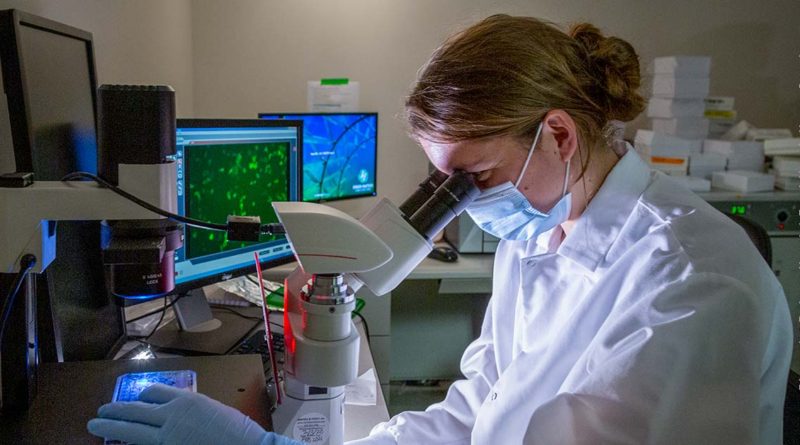Latest Fred Hutch research on COVID-19

Photo by Robert Hood / Fred Hutch News Service
As COVID-19 became a pandemic, scientists at Fred Hutchinson Cancer Research Center have been on the forefront of research to understand the virus and save lives through prevention and treatment. About 20% of Fred Hutch researchers have active projects related to the disease and the SARS-CoV-2 virus that causes it.
Read more about these studies, and their most recent results, in the highlights below. We’ll update this page regularly as new research is published.
March 2021
Addressing vaccine hesitancy in BIPOC communities
In a perspective published on March 31 in the New England Journal of Medicine, Dr. Michele Andrasik and colleagues discuss how to build trust, partnership and reciprocity between vaccine researchers and Black, Indigenous and people of color (or BIPOC) communities, with a special focus on the work of the COVID-19 Prevention Network.
Can coronavirus vaccines block asymptomatic transmission?
The new Prevent COVID U study, designed and managed by researchers at the Hutch-based COVID-19 Prevention Network, will enroll thousands of college students to answer one of the world’s most pressing questions about COVID-19 vaccines: Can these shots, which protect against serious symptoms, also prevent those who might still get infected from silently spreading the disease to others?
“What we would like to see is that the vaccine recipients who become infected have lower levels of virus in the nose or a shorter duration of infection than participants who became infected and are not vaccinated,” Dr. Holly Janes told Fred Hutch News Service.
Vaccine boosts natural protection to COVID-19
In a paper posted online on March 25 by the journal Science, a Fred Hutch team led by Drs. Leo Stamatatos, Julie McElrath and Andrew McGuire report that a single shot of either the Moderna or Pfizer-BioNtech vaccine boosted participant immune responses against SARS-CoV-2 by as much as 1,000-fold.
In a separate study posted on March 24 on the preprint server BioRxiv, Stamatatos and colleagues tested the neutralizing ability of 198 different antibodies found in blood samples donated by four different COVID-19 patients. They found several cross-neutralizing antibodies that could help inform the design of a “universal” human coronavirus vaccine.
“I think it is encouraging that you can harness immune memory to SARS-CoV-2 and potentially neutralize forthcoming variants,” McGuire told Fred Hutch News Service.
Super-spreader events and the variants
In a non-peer-reviewed preprint posted on medRxiv on March 24, Dr. Josh Schiffer and colleagues find that super-spreader events will play a key role in the coronavirus variants’ ability to gain a foothold in a population, in addition to each variant’s natural infectiousness.
“We will in all likelihood create new variants on top of those that have emerged,” Schiffer told the LA Times. “And the ones that will win are the ones that dodge the vaccine or transmit more easily.”
“The public health message is more of the same. The really high-risk environments are crowded, indoor events. If we can avoid those and mask effectively, that is going to be key to prevent these variants from winning the race with the virus,” Schiffer told the Seattle Times.
COVID-19 in cancer patients
Dr. Petros Grivas and colleagues with the COVID-19 and Cancer Consortium published a study on March 18 in the Annals of Oncology that identified factors that were linked to more severe COVID-19 and death in patients with cancer who contract SARS-CoV-2.
“This study provides an in-depth take on several timely and really pressing issues in health care — highlighting the effect of COVID-19 on mortality, need for hospitalization, ICU care and mechanical ventilation, while it also illustrated racial disparities in cancer care,” Grivas said in a press release from the Seattle Cancer Care Alliance.
Ace2 and the microbiome
To enter cells, the coronavirus binds to a protein called Ace2 on the cell surface. New research in mice by Dr. Neelendu Dey’s team found that the amount of Ace2 on cells in the digestive and respiratory tract is associated with the particular mix of microorganisms living in the gut, also known as the microbiome. The study, published in the journal PLOS ONE on March 16, suggests that modulating the microbiome could be one strategy to reduce the risk of COVID-19 infection or severity.
Preliminary results from trial of pill for people with coronavirus
On March 6 at the 2021 Conference on Retroviruses and Opportunistic Infections, a team of researchers reported preliminary results from a placebo-controlled, randomized trial of the experimental drug molnupiravir in people with symptomatic coronavirus infection. The team reported that molnupiravir reduced infectiousness by the last day of treatment (day five) with the antiviral.
The trial is being conducted at multiple research centers, and its Fred Hutch site is led by Dr. Elizabeth Duke.
“It won’t protect cells that are already infected, but it will prevent those infected cells from making new copies of the virus that might infect other cells,” Duke explained in a story on the Medium Coronavirus Blog.
Read more in Medscape Medical News.
Modeling single-dose vaccination
In a non-peer-reviewed preprint paper posted on medRxiv on March 3, Drs. Laura Matrajt, Holly Janes and colleagues model the conditions under which a single-dose vaccination strategy could help contain the pandemic more quickly. They also demonstrate the important roles that physical distancing and rollout speed play in vaccination campaigns.
“I hope people understand that it is really important to keep social distancing as much as possible while vaccination is happening,” Matrajt told the Seattle Met.




